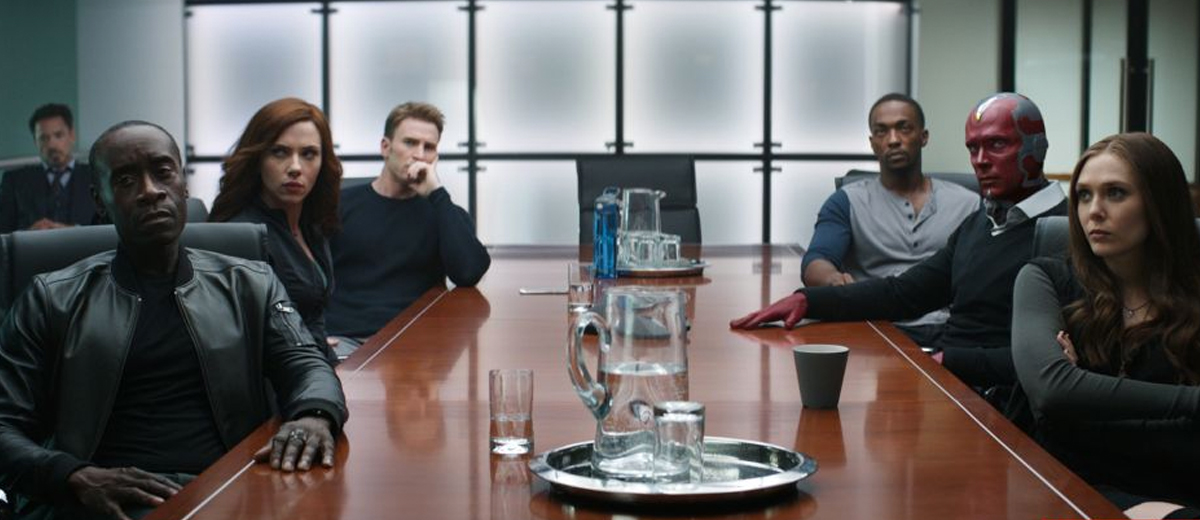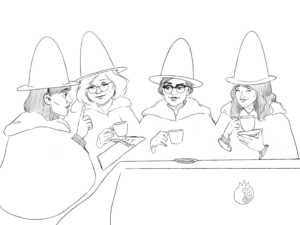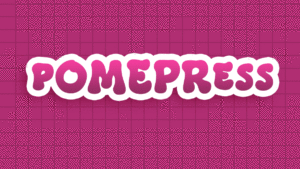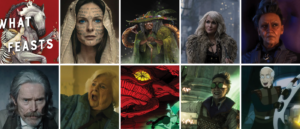Editor’s note: This post contains spoilers for both Captain America: Civil War and Sailor Moon S. I mean, you probably knew what you were getting into by clicking this link but consider yourself warned.
Captain America: Civil War is the Sailor Moon S of the Marvel Cinematic Universe — the morally-complex shit-just-got-real heart of a franchise known for its semi-lighthearted, relatively simple archetypical stories and fun ensemble casts. And like Sailor Moon S, Captain America: Civil War hammers home the point that violence is a self-perpetuating cycle and no matter what your allies say, you can save your poorly-socialized little buddy from the seemingly limitless devastation that they leave in their wake.
Captain America: Civil War and the Sailor Moon franchise as a whole both share one powerful message: that violence is the enemy of peace, and that answering festering hatred with more hatred only grows more evil in the world. While both series use action-oriented genre tropes as metaphors for the struggle of good against evil, nobody is entirely evil, not really. Not Iron Man, not Queen Beryl, probably not even the sketchy Secretary of State or the Witches 5. And at the end of the day, anybody can be saved, even if they choose not to be (whether you’re talking about Zemo or Queen Nehelenia).

But this is where the comparisons have to end because Cap isn’t Sailor Moon. His magical dude powers give him the power to fight evil wherever he finds it, but they don’t give him the power to heal the evil around weak and vulnerable pure hearts. Unlike Sailor Moon, Cap tries to fight his way out of every obstacle in his path, to devastating effect. And in a world where superhumans have been able to bring freedom to the masses for years without oversight, fighting your way out of every corner can lead to untold levels of death and destruction, leading to the need for more and more avenging. So how can the world break out of this mindless cycle of escalating violence? Through T’Challa, CA:CW presents the idea that the only way to do this is through shutting up, putting your weapons down, and just listening for a moment before leaping into the fray.
(Side note: Captain America: Civil War is also sadly lacking in ruggedly handsome women dangling from helicopters but we take our wins where we can find them in this life).
One of the reasons for CA:CW’s success was that it broke from the hot garbage tire fire of the comic it’s semi-adapted from. Let’s get this out of the way: Marvel’s Civil War is a trash comics event about a bunch of superhero reality stars accidentally exploding a schoolbus full of children that ends with St. Captain America, defender of freedom, getting murdered (for freedom!!!!) in front of a courthouse. Somewhere in between these two touchstones, Iron Man decides that the best way to prevent untrained superheroes from exploding innocent bystanders would be to make superpowered individuals “register” with the federal government and receive mandatory training for their powers. Naturally, the government has its own nefarious agenda for the hapless heroes that join their cause.
The marketing and promotion for the Civil War comics event led readers to expect a story contrasting a society’s need for safety against the importance of every citizen’s inalienable human rights. The two conflicting ideas actually presented by the comic, however, are that on one side, there are exceptional superhumans that deserve to live under a different set of rules and responsibilities than the rest of us schlubs. On the other side, there are fascists that want to use the bodies of the ubermensch as fuel for a corrupt and mediocre society. Yeah — Civil War is just as much of a libertarian propaganda piece as it sounds. The Superhuman Registration Act is one part Patriot Act, one part Every Conservative Grandpa’s Paranoid Nightmares About Liberals Undoing The Second Amendment, all over a Very 2006 landscape of punching and explosions and senseless destruction.

And that’s the beauty of Captain America: Civil War. In the film, as opposed to the comic, the story is actually nuanced because nobody is actually 100% correct. This film takes all of the trappings of a hypermasculine superhero story like the Civil War comic and uses the tropes that hold it up to pull apart the genre limb by limb. CA:CW uses quippy banter, property damage, intricate fight choreography, and the military-industrial complex to explain the futility of violence and the traditional revenge drama. Consider the movie’s main fight sequence, where everybody and their grandma are throwing down in the thankfully evacuated airport. Remember how despite exploding planes and trucks and terminals, the fight started off feeling like a massive game of capture the flag between friends until Rhody got seriously hurt? Remember how that fight was super fun and personable until somebody you cared about got permanently injured?

CA:CW convinces you to suspend your disbelief like you would normally do while taking in a superhero movie until it pulls the rug out from under you and makes you wonder if your complacency with all this destruction wasn’t a little bit misguided. In arguably the film’s most poignant scene, you observe the Avengers watching a reel of their greatest hits, followed by the implied and obvious staggering deaths that followed the exciting explosions and lasers and monster punching. As the movie unfolds, you’re confronted with the fact that all those super fun popcorn movies we’ve been trained to enjoy depend on the broken, mangled bodies of dead children. And we didn’t care until we remembered that the collapsing buildings in the middle of that city probably had people in them, which we conveniently forgot in the heat of the moment.


And consider, for a moment, that unlike the Civil War comic, the movie doesn’t necessarily take Cap’s side about being a tremendous, uncompromising asshat. No matter how you feel about Bucky, isn’t it telling that Cap’s response to even the first mention of proposed oversight is to complain that the Avengers wouldn’t have the freedom to go wherever they wanted to go? Sure, in the Civil War comic, the Avengers were incorporated into the Bush era American government — that seems like a pretty good way to get roped into a forced deployment. But considering that the IRL UN is wrapped in considerable red tape trying to manage the interests of literally the whole world, if I were an Avenger, I’d be more worried that I’d be spending the next 30 years of my career picking up trash from the side of a highway. Cap points out that government control of the Avengers would probably lead to getting roped into shady shit, but do y’all really think that the UN is going to employ them for much more than peacekeeping missions at most? How could such an attention-grabbing group like the Avengers get roped into shady cloak-and-dagger covert ops with the eyes of the entire world on them? Isn’t that what the already government-controlled S.H.I.E.L.D. (RIP) is/was for?
Cap essentially pushes away from the idea of needing to ask for permission before taking on a mission. Considering that he’s been frozen since a time when America’s enemies were literally evil, he missed out on how much we made everyone hate us by getting involved where we weren’t wanted. If America has learned one thing in the past 60 years, wouldn’t that lesson be that bringing freedom to a country that doesn’t want you there isn’t really freedom at all?

(And as a liberal killjoy, I have to say: would you really be okay with a private corporation having the right to invade any sovereign nation they want, for any reason they want, with no accountability or responsibility to the people they’re supposedly bringing freedom to? Do you want a bunch of people with gun arms to have the right to blow up your home and walk away for shawarma afterwards like nothing happened? Would you feel satisfied knowing they probably felt real bad about it for a few days?)
Sure, Tony throws his lot in way too easily with obviously shady government officials. And sure, he tries to convince Cap to sign a contract with a vague promise that it can be amended later. (Like, come on, Tony, I know you’re smarter than that.) But at the same time, Cap doesn’t want to talk about it. He doesn’t really want to amend the agreement. He sees the entire UN as an obstacle to his freedom to bring the freedom, and to Cap, it doesn’t matter if the whole world, including the people he says he’s trying to protect, tell him to stay out of it — he’s going to go with his gut and punch his way out of this corner, and everybody else can deal.

So basically, Cap essentially pushes a conflict into existence when realistically, if he’d just sat the hell down with one of those FDR pens and hashed out a legal agreement with Tony that protected the interests of the Avengers while making the world of un-powered normal folks less in fear for their lives, the entire plot of this movie could have been avoided.
But instead, the Avengers launch into a huge throwdown that involves enlisting kiddos like sweet, precious baby Spider-Man, blowing up an airport, and (seemingly) permanently paralyzing sweet, precious Rhody. The Avengers were formed in order to take on big enemies normal armies couldn’t fight, but turned into a spinning gyre leaving bodies in their wake that others would want to avenge. Every single death is a crisis; every single death is the end of a world, if not the world. Every person crushed in Sokovia, incinerated in Lagos and Vienna, murdered by newly-superpowered bad guys trying to make their mark in the world leaves behind a grieving loved one wondering how this beautiful world of a person could have been thoughtlessly, instantly destroyed. And they can’t even get an answer to their grief — the aliens are gone, why are you mad because your child is dead? How important is your baby boy when compared to the needs of the many? And ironically, Cap sees the way that one man could get ground into the dust by an unfeeling governmental force beyond his control in the way that Bucky becomes Public Enemy #1. Cap vehemently fights for the rights of this one man while ignoring all of the others that died for his right to fight for freedom. What about their families? What about their right to hold the powers that be accountable for their unfair deaths? Like Bucky, all those casualties of the Avengers’ Big Damn Heroing are caught in an unfeeling system, but unlike Bucky, they don’t have Big Damn Hero friends to fight for them. Not to get all ~Comics, Everybody~ on y’all but who watches the goddamned watchmen, Cap?
And while Cap seems poised to be the Super Sailor Moon of this epic, coming out at the climax of the fight with a chalice of pure, healing light, it’s really T’Challa that starts the healing process by identifying how vengeance only continues to breed more vengeance. After an entire film of attempting to extract revenge for his father’s death from the wrong man, T’Challa sees how subjective the lens of justice really is. If he had actually managed to kill Bucky, he would have only furthered the cycle his father was swallowed up in. Is violence really the heart of justice? Will taking that life really make you feel better? When will it end? Unlike literally everybody else in this film, T’Challa just…listens. He listens to his enemy and considers the heart of his anger instead of punching justice into the world. He quietly and thoughtfully allows Zemo to take ownership of the destruction he caused and in turn, Zemo realizes his place in the cycle as well. Can you imagine Iron Man or even Captain America thoughtfully listening to a sworn enemy (of freedom!!) realize how far astray he allowed grief and anger to lead him? T’Challa doesn’t try to weigh his vengeance against Zemo’s. By the end of the film, he sees that determining objective justice isn’t up to him — a lesson Cap completely misses, over and over again.

By the end of the film, the splintered Avengers feel out their roles in a world that is suddenly much more complicated and unsettling than the one they were tearing it up in back in 2012. Suddenly, there aren’t just heroes and Nazis/evil alien gods/murder robots. There are just regular people — some super strong, some super smart, some who can just do super sick parkour — caught within overlapping systems that couldn’t really care less about their safety or well-being. The ubermensch has been forced into submission in order to interact with a society of other people. No one, no matter how special or empowered, can cause a massive loss of life without drawing the ire of the people they carelessly crushed beneath their feet. Sure, the Avengers need to figure out how to navigate this new cultural landscape. Sure, Cap needs to fundamentally get that he can’t heal the staggering volume of dead and wounded civilians through good intentions and a pure heart alone. But whether they choose to act on it or not, at least now the world has confronted the Avengers with the gristly, unintentional consequences of their superheroic actions. Hey Avengers: isn’t it a good time to lay down your weapons and just listen?





